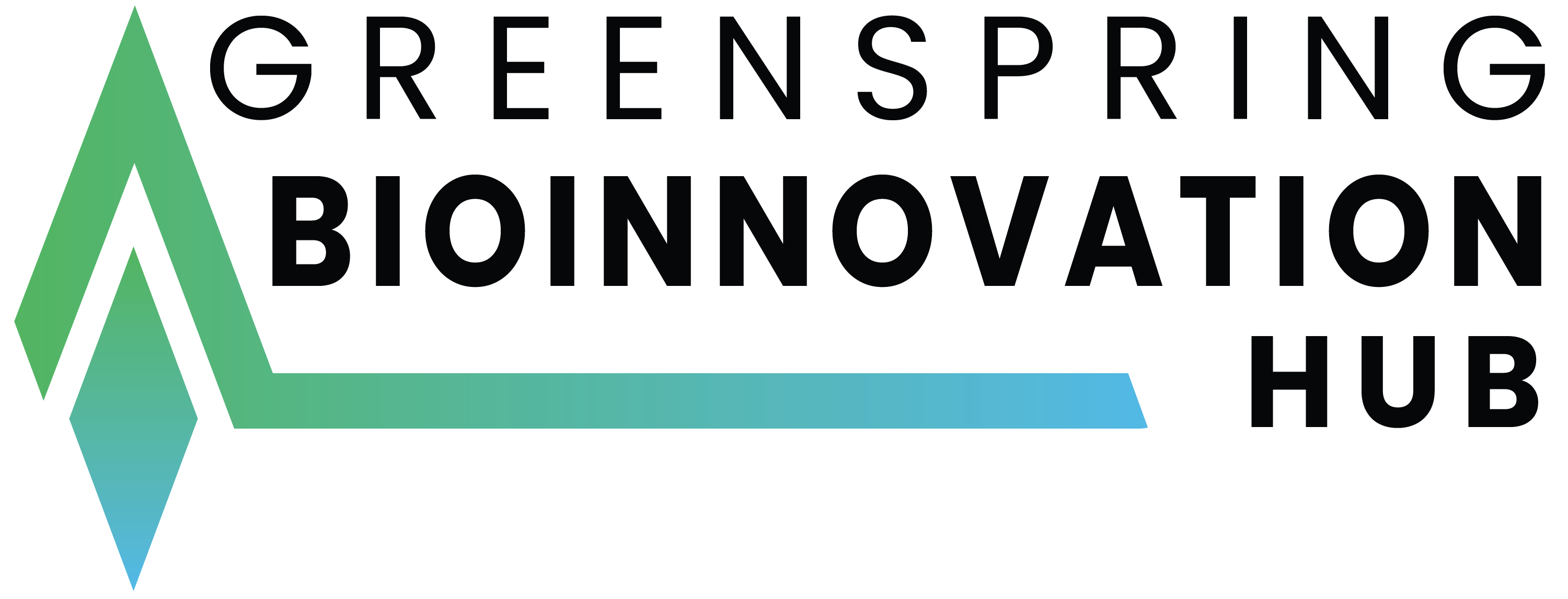We are thrilled to share some exciting news with you – the Nova Scotia Innovation Hub is transforming and emerging as the Greenspring Bioinnovation Hub!
Supporting innovation in Nova Scotia’s Bioeconomy for the transition to a low-carbon future.

We drive innovation in Nova Scotia’s Bioeconomy.
We work with businesses in the Bioeconomy that are establishing or growing operations in Nova Scotia, from local start-ups to international industry leaders. We support these innovative businesses along their commercialization pathway, leading to smarter utilization of Nova Scotia’s renewable natural resources, new low-carbon products for local and export markets, and enhanced prosperity for all Nova Scotians.
Our Purpose
Inside the bioeconomy
What is the Bioeconomy?
Nova Scotia’s Bioeconomy is a regenerative system of sectors made up of new and innovative organizations developing sustainable uses for bioresources and biotechnology. This interconnected, circular economy sources, distributes, uses, reuses and finds new applications for renewable bioresources. These efforts lower our environmental impact and emissions, and provide our province with a unique opportunity to build resilience, power our economy and drive export growth.

Primary Harvesting
It starts with the harvesting of renewable bioresources from the forestry, agriculture and ocean sectors, yielding a range of raw materials such as wood fibre, food crops, seafood and more. Rural areas mainly drive these activities, stimulating rural development and employment while supporting a low-carbon economy transition.
Feedstocks
Much of the primary harvest, like fruit, makes its way directly to consumers, but a range of raw materials arrives at Biorefineries, along with by-products from along the supply chain that might have otherwise been discarded. Biorefineries can use novel and dedicated technologies, or might be traditional facilities such as sawmills, pulp and paper mills and food processing plants.
Biorefineries
Using innovative techniques to get the most value from raw materials, biorefineries convert local biomass into a spectrum of both traditional and new, innovative products. Some of these techniques are improvements on those used for generations, while some are much newer such as torrefaction, pyrolysis and various extraction methods.
Bioproducts
From traditional lumber, paper, beverages and fish filets, to innovative bioproducts like plastics, fuels, chemicals and new sources of human and animal nutrition. These innovative products are sustainable, low-carbon alternatives to products derived from carbon-intensive, non-renewable resources such as petroleum and coal.
Closing the Loop
Many bioproducts are compostable and return to the soil to support future growth. Other biomaterials can be collected at the end of their lifecycle, diverting those materials from landfills and sending them back into the Bioeconomy’s circular chain for reprocessing and reuse.

What is the Bioeconomy?
Nova Scotia’s Bioeconomy is made up of new and innovative organizations developing sustainable uses for bioresources and biotechnology. The sector cooperates to source, distribute, use, reuse and find new applications for renewable bioresources, lowering environmental impacts and emissions, and providing our province with a unique opportunity to develop a novel industry that can build rural resilience, power our economy and drive export growth.
Our Impact*
Invested Capital
%
Rural Investment
Export Value
GHG Reduction (tons per year)
Full-time Jobs
Renewable Feedstocks (tons per year)
*Potential based on planned projects
We support a range of entrepreneurs and stakeholders across the Bioeconomy:
Focus Areas
Feedstock Suppliers
We help maximize the value that harvesters, suppliers and processors from Forestry, Agriculture, Oceans and Solid Waste sectors realize from their products and by-products.
Industry Partners
We help create value for strategic industry partners, for example, co-location opportunities that capitalize on synergies to share space and infrastructure such as feedstock handling, wastewater treatment, excess energy and CO2.
Low-Carbon Products and Technologies
We support businesses utilizing bio-based resources to develop and commercialize new low-carbon products and technologies, including fuels, chemicals, materials, human and animal nutrition, and more.
End Users
We provide organizations seeking to reduce their environmental impact with expert advice on low-carbon, bio-based products, connecting them with Nova Scotian suppliers, and providing support to facilitate project development.
Policymakers
Governments of all levels have a role to play in the transition to a low-carbon economy. We support them in this role by providing expert advice and guidance on how the Bioeconomy can accelerate this transition, while enhancing economic prosperity.
How We Help
We create and promote best-in-class, investment-ready conditions for a low-carbon, bioresource economy.
Success Stories
Why Nova Scotia?
A network leading the way to a cleaner, more sustainable future.
With an array of under-utilized, renewable natural resources from forestry, agriculture, oceans and solid waste sectors, Nova Scotia is naturally home to a vibrant bio-based industry seeking new and innovative collaborations, easy access to international transportation routes, and a responsive, supportive and close-knit ecosystem. We’re amplifying this potential as our stakeholders create opportunities for rural communities, and help grow a strong, sustainable and independent Bioeconomy using our own resources and people.
Agriculture
Fisheries
Forestry
Access to Organics
Global Supply Chains



Industrial Partnerships
A network leading the way to a cleaner, more sustainable future.
Agriculture
Fisheries
Forestry
Access to Organics
Global Supply Chains




















